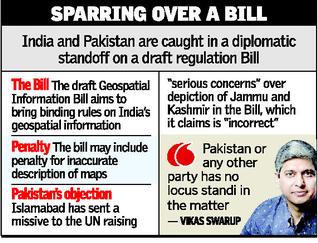We speak here of the Geospatial Information Regulation Bill, 2016… something that could have serious implications for anyone who uses maps in India. It has also resulted in something of a diplomatic furore in the past day or so. We find out more about the bill, its implications and the reasons why it has become a point of contention between India and its most combative neighbour Pakistan.
The Geospatial Information Regulation Bill, 2016

The Geospatial Bill has been publicized and currently the government has been asking for comments on the bill before it is made into an act or law that is binding on the citizens. The main aims of the bill are to ensure “1) standardised depiction of national boundary of India, and 2) complete removal of depiction of intelligence, military, and other security establishments from publicly available maps.” Some have expressed concern that this bill, if made a law could have serious implications for individuals and businesses and anyone who use maps in service delivery.
In other words, government permission will be required before using maps of India. Creating of maps and even sharing of locations will become subject to government licensing by virtue of the bill. The possible obstacles a bill like this would create in a technology driven commercial space is evident. “Security Vetting Authority for retaining such geospatial information” will require permission, payment of fee and obtaining of a license. Taxi companies that use GPS, companies that provide doorstep delivery, you and me, when we send our locations to friends via Whatsapp could fall within the ambit of this law.
Why Pakistan is objecting to the Geospatial Bill

Pakistan has expressed concern to the UN about the bill about the way in which Kashmir is portrayed. In a letter addressed to the UN General Secretary, Pakistan has said that they have serious concerns about the portrayal of J&K; saying it is “incorrect and legally untenable”. Pakistan also feels that this bill constitutes a violation of international law.
The Indian response has been clear: this bill constitutes the internal legislative process of the country and in no way concerns Pakistan which has no locus standi in the matter. As J&K is a part of India in its entirety, Pakistan or any other country can raise no objection said a representative of the Ministry of External Affairs.

OK, so Pakistan has no right to interfere. But shouldn’t we Indians be paying some attention to the bill that is scheduled to become law this June? Those interested could visit SaveTheMap for interesting insight and observations.
Author – Reena Daruwalla





